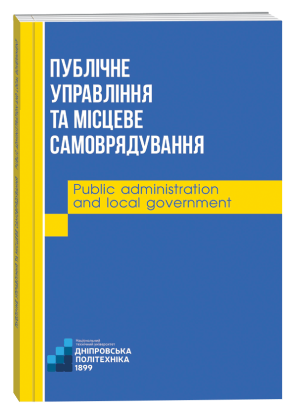PUBLIC ADMINISTRATIVE CONTENT OF THE INSTITUTE OF LAW ORDER IN SPECIAL CONDITIONS OF STATE CREATION
DOI:
https://doi.org/10.32782/2414-4436/2024-1-4Keywords:
state, mechanism of law and order, law and order, public management activity, public administrationAbstract
The article analyzes the public administration content of the institution of law and order in the special conditions of state formation, substantiates the essence of such an institution in the context of a change in the paradigm of state formation. In the conditions of state formation, when the political and social system of the country is in a state of transformation, the institution of law and order plays a particularly important role. It guarantees the safety of citizens, protects their rights and freedoms, and contributes to the stabilization of society. Goal. In this article, the purpose of the study is to characterize the essence of the institution of law and order in the special conditions of state formation – armed aggression against Ukraine, the continuation of the decentralization reform, and systemic transformations from the standpoint of branch management. An urgent need of the science of public administration is the study of the public management content of the activities of the constituents of the institution of law and order in both theoretical and practical terms, the study of law and order from the standpoint of the modern concept of open administration. Topicality. The analysis of the formation of the national mechanism for ensuring law and order in the special conditions of state formation is important in the context of the change in the public management paradigm of modern state building, the stochasticity of state reforms of 1991–2019, the contradictions in the content of such reforms and, as a result, the need to form a new content of state formation. The relevance of the study of the content of law and order in the conditions of the legal regime of martial law (PRVS) is due, firstly, to the peculiarities of the functioning of the system of public management activity (SPD), the increase in the number of subjects of such activity. Secondly, by changes in the nature of offenses, because the level of organized crime, cybercrime, crimes related to trafficking in people, weapons, drugs, as well as crimes against the environment is increasing. Thirdly, the complex content of subject-object relations in the legal system. Fourthly, by changing the functional assignment of law enforcement forces, by directly including law enforcement units in combat operations against the aggressor. Fifth, by increasing the role of information technologies in social relations. Sixth, by changing the essence of law enforcement activity itself. The results. We proceed from the statement that the level of responsiveness of the modern institution of law and order to the needs of citizens is based on their trust in the state, in the system of state administration and law enforcement agencies, social activity in ensuring law and order, and a sense of justice in society. In the modern sense, the institution of law and order is an integrated system of laws, rules, regulations, public institutions and management bodies, which are aimed at ensuring compliance with the Constitution of Ukraine, the laws of Ukraine, maintaining order and stability in society. The Institute of Law and Order is responsible for regulating relations between citizens and these organizations, ensuring public safety and law and order, as well as taking measures in case of violation of laws to ensure justice and responsibility, restoration of legal rights and interests of citizens. In the context of the special conditions of state formation, the institution of law and order, in the format of a modern legal state, is a complex system that guarantees the rule of law, observance of the rights and freedoms of citizens, inviolability of human rights, transparency and responsibility of power structures, the development of legal culture and ensuring justice. The institute itself ensures the implementation of the principles of the rule of law, where laws and legal norms are the basis of government activity, and ensuring rights and legality become key tasks for ensuring the principles of democracy and the rule of law. At the same time, the forms and methods of ensuring law and order may include the force format of implementing the norms of the current legislation. Conclusions. The institution of law and order in a modern legal state, in the context of the principle of democracy, is focused on ensuring the participation of citizens in the processes of forming laws, ensuring their rights and freedoms, and exercising control over the activities of law enforcement agencies. The Institute of Law and Order uses the interaction of citizens with power structures to strengthen the responsive function of public authorities based on the principles of open governance. It also ensures transparency and openness in the activities of state bodies, as well as protection of minority rights and equal opportunities for all members of society within the law. This approach supports inclusiveness, justice and democracy in the system of law and order of a modern legal state. The activity of law enforcement agencies in the context of democracy also provides mechanisms of public control, participation of citizens in resolving issues of law and order, and support for the principles of the rule of law.
References
Про державний контроль за міжнародними передачами товарів військового призначення та подвійного використання: Закон України від 20 листопада 2003 року № 549-ІУ. URL: https://zakon.rada.gov.ua/laws/show/549-15#Text.
Про державну таємницю : Закон України від 21 січня 1994 року № 3855-XII. URL: https://zakon.rada.gov.ua/laws/show/3855-12#Text.
Про захист суспільної моралі: Закон України від 20 листопада 2003 № 1296-ІУ. URL: https://zakon.rada.gov.ua/laws/show/1296-IV#Text
Про основи національної безпеки: Закон України від 19 червня 2003 року № 946-ІУ. URL: https://zakon.rada.gov.ua/laws/show/964-15#Text
Про демократичний цивільний контроль над Воєнною організацію і правоохоронними органами держави: Закон України. URL: https:// zakon.rada.gov.ua/laws/show/975–15.
Боняк В. Особливості організації та функціонування органів охорони правопорядку в аспекті сучасної змішаної форми правління в Україні. Право України. 2014. № 8. С. 85–95.






